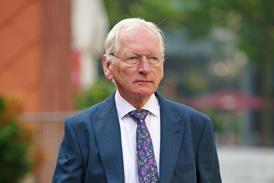The sustainability of the legal sector is not just about financial performance; it is about people. A sustainable profession is one that protects mental wellbeing, fosters ethical practice, and maintains the trust and confidence of the public it serves. As leaders navigate the complex, uncertain and rapidly changing legal working environment, the question they need to ask themselves is: are we creating a profession that can progress into the future?

At LawCare, we have known for a long time that the mental health of the legal community is a cornerstone of that sustainability. For over 25 years, we have supported thousands of people in our sector. Lawyers, business services staff, paralegals and trainees across the UK have reached out for help with concerns such as stress, anxiety, bullying or a fear they are not cut out for the law. Each person who contacts us is a reminder that every professional is a human being undertaking demanding, high-stakes work, and that this can take its toll.
Our latest research, Life in the Law 2025, launched on 1 October, offers a sobering snapshot of where we stand. Building on our 2021 study, this year’s findings reveal that while activities to build awareness and support mental wellbeing in workplaces have become more common, this has not translated into improved wellbeing across the sector. Our study found that the persistent and long-term issues – high work intensity, low psychological safety, anxiety, bullying and harassment – are contributing to low mental wellbeing scores and a sector at high risk of burnout. We also found that 56% of people are considering leaving their role in the next five years, with nearly a third considering leaving the law altogether.
This data tells us that we need to do more to understand why current wellbeing efforts are not having the desired impact. As a sector, we need to shift from reactive short-term measures to a systemic, preventative approach that embeds sustainable working practices in everyday legal practice.
This shift towards sustainable working practices is also on the agenda for regulators and early career-stage legal professionals. The Solicitors Regulation Authority and other UK regulators are taking a keener interest in legal workplace culture, with a growing recognition that poor supervision and toxic workplaces pose professional conduct risks.
At the same time, Generation Z, the newest cohort of aspiring and early-career lawyers, is bringing fresh perspectives to the profession. These lawyers are purpose-driven and unafraid to speak about their expectations. They want to work in environments that are inclusive, psychologically safe, aligned with their values, and where mental health and wellbeing are supported. They are less willing to tolerate cultures that normalise long hours and high workloads.
Central to this is the need to manage psychosocial risks, which are the aspects of work that can harm mental health, such as excessive workloads, poor communication and a lack of effective people management. Just as we would not ignore a physical safety hazard in the office, we must not ignore the psychological ones. Investing in training for managers, encouraging open conversations and ensuring manageable workloads are integral to risk management and sustainable practice.
The business case for a positive, healthy culture is well evidenced. The Mindful Business Charter has recently released a paper on this. Workplaces where people feel valued and supported are more productive, innovative and happier. They deliver better client service, attract and retain people, and mitigate the risks of reputational or regulatory issues.
But the stakes go beyond the workplace. The legal sector has a fundamental social contract with the public to uphold the rule of law, ensure access to justice and act with integrity. If our own working environments are unhealthy, exclusionary, or unsustainable, we risk our ability to deliver on this social contract.
Diversity and inclusion are also a structural commitment for sustainability. We need people from all backgrounds and perspectives to ensure that the law can meet the wide range of needs in society. This strengthens the quality of legal practice, broadens the understanding of clients and communities, and helps maintain public trust.
We have a collective responsibility to shape a future where legal careers are not synonymous with burnout, where people can perform at their best and where wellbeing is viewed as a core part of the business of doing law.
On the path to a sustainable future lie the evidenced-based recommendations of this report: actively managing workloads, prioritising and valuing people management, embedding hybrid and flexible working, evaluating workplace wellbeing programmes, and legal education that equips those joining the sector with the skills and knowledge they need for 21st-century careers. I urge all leaders to choose it.
Elizabeth Rimmer is chief executive of LawCare































No comments yet